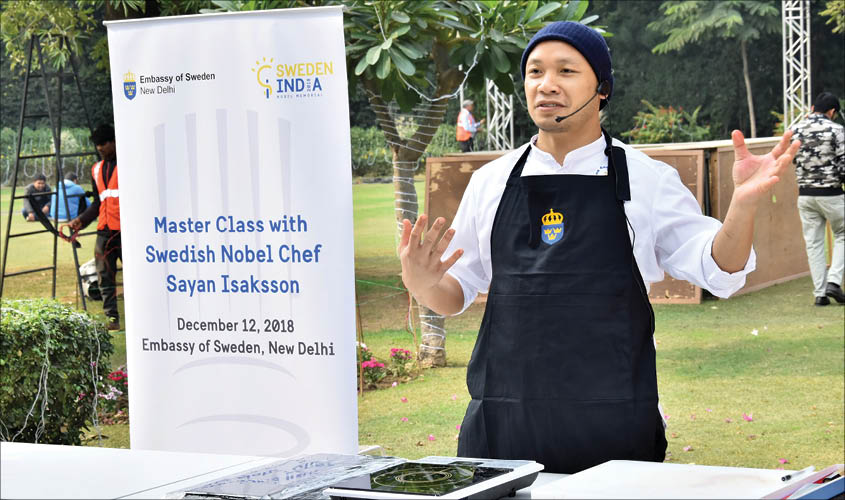The celebrations of Sweden India Nobel Memorial 2018 in Delhi earlier this week brought the Swedish Michelin-starred chef Sayan Isaksson to India. After Pune and Mumbai, he treated Delhi to a cooking master class at the Embassy of Sweden on 12 December.
The Sweden India Nobel Memorial Programme 2018 has a lineup of events slated to take place over a couple of months. They have organised events ranging from seminars and panel discussions to competitions and workshops. The master class was part of the celebrations in remembrance of the Swedish innovator, entrepreneur and philanthropist Alfred Nobel. The overall programme aims to celebrate the achievements of both Swedish and Indian Nobel Laureates.
For his master class focusing on India-Swedish culinary fusion, Chef Isaksson chose the theme “Shapes of Nature”. The menu curated by the chef included Beetroot Petals, Mushroom Tea, and Browned Butter; Treebranch, Black Garlic and Herbs; Oystershells, Cucumber and Dill Raita; Ghost of Onions, Baked Onions and Onion Broth; Marbeled Quaileggs and Grilled Emulsion, Autumn Leafs, Frozen Apples and Milk. His unique style brought together global culinary influences and contemporary Scandinavian tastes and styling. Each dish was prepared with precision and had a delightful mix of flavours.
Talking about the theme, Chef Isaksson said he wanted to stay true to the principle of sustainability. “I am really into organic food and sustainability of food products. I try to imitate nature when I cook. That’s why we have used edible oyster shells, tree branches and leaves etc. for the menu presented here.”
Now a household name in Sweden, Chef Isaksson was born in Thailand. He emphasised that his recipes are inspired by various global cuisines, ranging from Thai to Japanese to Indian and more. He received wide acclaim when his restaurant Esperanto, formerly in Stockholm, Sweden, received the prestigious Michelin star.

When asked about his passion for cooking, he quipped, “I love to eat and that is why I became a chef.” Chef Isaksson was a teenager when he decided to become a professional chef. “I applied for cooking school when I was 15 and then after two years of training, I applied for work. That’s when the real education started. You change places and you learn from different chefs and get new inspirations,” he said.
He has many achievements to his name. He was part of the Swedish Culinary team that won the 2002 Culinary World Cup in Luxembourg and 2004 Culinary Olympics in Erfurt, in Germany. Chef Isaksson was also the man behind the Nobel Banquets of 2015 and 2016. He was responsible for feeding more than a thousand people at these high-profile dinners.
He shared his experience of heading the Nobel Banquet: “The only word I could come up with when they invited me was, ‘wow’. I immediately said yes. The process takes almost a year. It involves coming up with three options for dinner. We discuss it with the Nobel Committee and their experts, after which it is narrowed down to two menus. We are required to serve those dishes to them a couple of times, and they decide the final menu. It was a wonderful experience.”
Chef Isaksson also threw light on the Swedish cuisine and food trends. According to him, Swedish food is all about “searching”. He elaborated that Swedish cuisine has a base to stand on, but it seeks to incorporate other cultures and tastes into it. He said, “I used to say that I am a purist, but I am not really. I am always wildly inspired by different countries and cultures. I really like the world community of the food industry.”
From his personal experience, he shared how fish and meat are becoming more like condiments in restaurants around the world. The main role in modern dishes is being played by vegetables now. According to him, this food trend is happening because people are getting conscious about the environment.
At the master class also, he advocated for the organic food trend. “Vegetables can be equally luxurious as fish and meat, depending on the type, how it was grown and what a chef does with it. That’s really important. My approach is very organic in the sense of the expression. We focus more on the techniques. I find the highlight on vegetables interesting,” he said.
So what’s in the pipeline for the world-renowned chef? He excitedly mentioned a secret project that he is working on, but did not divulge the details. For now, he just wants to travel to various countries and gain perspective on different cuisines.

